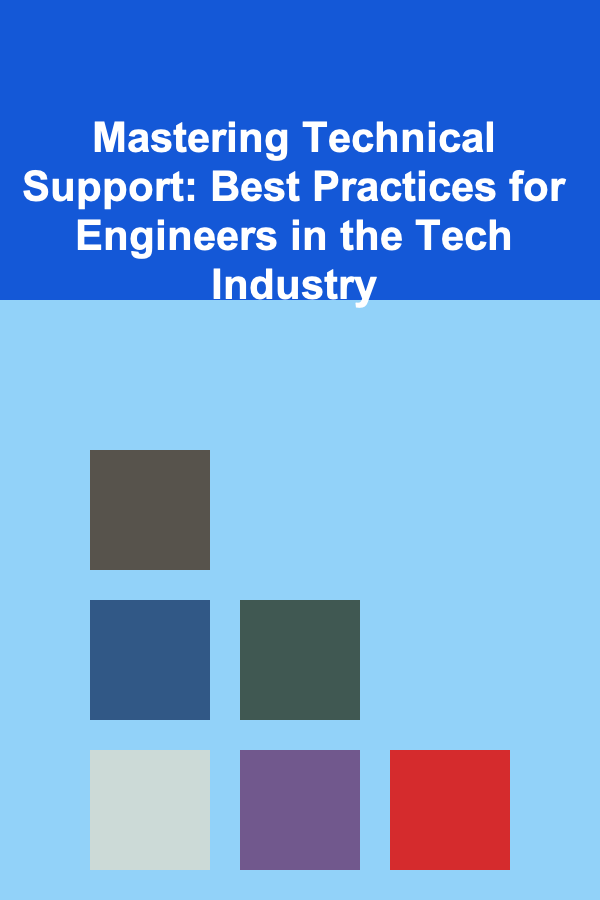
Mastering Technical Support: Best Practices for Engineers in the Tech Industry
ebook include PDF & Audio bundle (Micro Guide)
$12.99$10.99
Limited Time Offer! Order within the next:

Technical support engineers play an integral role in the tech industry. They are the frontline warriors who troubleshoot issues, assist customers, and ensure that products or services operate as expected. The challenges they face are diverse, ranging from simple user errors to complex, system-wide failures. To thrive in this role, engineers must combine technical expertise with communication, problem-solving, and customer service skills.
In this guide, we'll explore best practices for technical support engineers, offering actionable advice on how to excel in this fast-paced and critical field. Whether you're new to the role or an experienced engineer, these best practices will help you provide top-tier service and grow in your career.
Master Core Technical Knowledge
The backbone of any successful technical support engineer is a deep understanding of the technology they support. Whether it's a software application, hardware device, or network system, a technical support engineer must be equipped with thorough product knowledge.
Key Areas to Focus On:
- Product Proficiency: Ensure you understand the core functionality, features, and common issues related to the product or service you're supporting. The better you know your product, the quicker and more effectively you can assist customers.
- Systems and Infrastructure: Be well-versed in operating systems (Windows, macOS, Linux), networking concepts (IP addressing, DNS, firewalls), and database systems (SQL, NoSQL). This knowledge will help you troubleshoot a wide range of issues and offer targeted solutions.
- Tools and Diagnostic Software: Learn to use diagnostic tools, logs, and monitoring software relevant to your field. Whether it's debugging software issues or analyzing hardware failure, tools like ping tests, Wireshark, or system logs will help pinpoint problems efficiently.
Actionable Tip:
- Dedicate time every week to reviewing product documentation, release notes, and bug reports. Practice troubleshooting in a sandbox or virtual environment to reinforce your technical skills. Additionally, certifications from providers like CompTIA, Cisco, or AWS can help validate and deepen your expertise.
Develop Effective Problem-Solving Skills
Technical support isn't just about knowing the answer---it's about identifying the root cause of a problem and finding the best solution. This requires excellent analytical thinking and troubleshooting skills.
Key Practices for Effective Problem-Solving:
- Structured Troubleshooting: Approach each issue methodically by following troubleshooting frameworks, such as the Five Whys or Divide and Conquer. Break down the problem into smaller parts and systematically test different hypotheses.
- Log and Document Problems: Keep detailed records of problems, solutions, and diagnostic steps. This documentation can help you identify patterns, anticipate recurring issues, and improve response times.
- Root Cause Analysis (RCA): Don't just fix the symptom---dig deeper to identify the underlying cause. This approach will help prevent future issues and improve the overall stability of the system or product.
Actionable Tip:
- In your daily tasks, practice identifying patterns in customer issues. For example, if you notice multiple customers experiencing the same error, investigate whether it's a widespread issue or a common user mistake. You may need to document this for internal teams and suggest product improvements.
Master Communication Skills
An often-overlooked aspect of technical support is communication. A great technical support engineer knows how to convey complex technical concepts clearly and concisely, especially to non-technical users. Clear communication not only helps in resolving issues efficiently but also builds customer trust.
Key Aspects of Communication:
- Active Listening: Pay close attention to what the customer is saying. Clarify details and ask probing questions to fully understand the issue before jumping to conclusions. Sometimes, the problem isn't what the customer initially describes.
- Simplify Complex Ideas: Many users may not have a technical background. Your ability to translate complex technical jargon into simple, understandable language is essential. This builds trust and helps customers feel confident in your expertise.
- Empathy and Patience: Customers often contact support when they're frustrated. Show empathy by acknowledging their concerns, demonstrating understanding, and offering a positive, solution-oriented approach. Patience is especially important during lengthy or complex issues.
Actionable Tip:
- During every customer interaction, use phrases like "I understand how this issue can be frustrating" to convey empathy. Practice explaining a technical concept in simple terms to a friend or family member who isn't in tech. This will help refine your ability to simplify explanations.
Customer-Centric Approach
At the heart of every successful technical support interaction is the customer. Providing exceptional customer service is about more than solving the problem; it's about making the customer feel valued and heard.
Best Practices for a Customer-Focused Approach:
- Be Proactive: Don't wait for issues to escalate. Check in with customers regularly, especially if you know of a potential issue that could affect them. A proactive attitude can prevent frustration before it begins.
- Set Expectations: Be clear about the timeline for resolving issues. If a solution will take time, communicate that to the customer upfront. Manage their expectations by explaining the steps involved in the troubleshooting process.
- Follow Up: After resolving the issue, follow up with the customer to ensure everything is functioning as expected. This shows that you care about the customer's experience and can lead to higher satisfaction rates.
Actionable Tip:
- Make it a habit to check on the customer's experience after resolving an issue. A quick follow-up message like, "I just wanted to confirm that the issue has been resolved to your satisfaction," can leave a positive, lasting impression.
Time Management and Organization
In technical support, engineers often juggle multiple tasks at once---handling incoming requests, resolving issues, and managing documentation. Effective time management ensures that each case is handled efficiently, and no customer is left waiting unnecessarily.
Time Management Practices:
- Prioritize Cases: Use a system to prioritize tickets based on severity and urgency. Critical issues, such as system outages or security vulnerabilities, should be handled first, while less critical problems can be addressed later.
- Stay Organized: Keep detailed records of customer interactions, resolutions, and follow-up actions. This not only helps with future support cases but also allows for smoother collaboration with other team members.
- Avoid Multitasking: Although it may be tempting to juggle multiple tasks at once, multitasking often leads to mistakes. Focus on one task at a time and complete it before moving on to the next.
Actionable Tip:
- Use a ticket management system like Jira or Zendesk to categorize and prioritize cases. Set aside specific time slots for handling support requests and avoid distractions during those periods. This will help you maintain focus and improve response times.
Continuous Learning and Adaptability
The tech industry evolves rapidly, and so does the role of a technical support engineer. New tools, technologies, and products emerge regularly, so staying up-to-date is essential.
Best Practices for Staying Ahead:
- Ongoing Education: Take part in online courses, webinars, or workshops to keep learning about the latest technologies and best practices in technical support. Platforms like Coursera, LinkedIn Learning, and Udemy offer valuable resources.
- Network with Peers: Join forums, online communities, or attend industry conferences. Networking with other professionals allows you to share experiences, learn new tips, and stay updated on the latest trends in the field.
- Feedback Loops: Actively seek feedback from customers and colleagues. This helps you improve your technical and soft skills and identify areas for growth.
Actionable Tip:
- Set a goal to complete one certification or training course every quarter. This commitment will help you continuously expand your skill set and stay current with industry advancements.
Collaboration with Cross-Functional Teams
Technical support doesn't work in isolation---it's often a collaborative effort between different teams, including development, quality assurance, and product management. Effective communication and collaboration across teams can significantly enhance the support experience.
Best Practices for Collaboration:
- Work Closely with Developers: When handling complex technical issues, liaise with developers to get a deeper understanding of the product. They can provide valuable insights that may help resolve issues faster.
- Escalate Effectively: When you cannot solve a problem within your skill set or scope, escalate the issue to the appropriate team with clear, detailed information. This will help ensure a smoother handoff and faster resolution.
- Provide Feedback: As a support engineer, you have valuable insights into customer pain points and recurring issues. Share this feedback with product teams to help improve the product and reduce future support cases.
Actionable Tip:
- Build a relationship with key members of other teams. Regularly communicate and share insights on common customer issues. This collaboration can result in better product development and quicker resolutions for support cases.
Conclusion
Mastering technical support requires a balance of technical expertise, problem-solving skills, communication, and empathy. By following these best practices, engineers can provide outstanding service, resolve customer issues efficiently, and contribute to the ongoing improvement of products and services.
The best technical support engineers are not just experts in troubleshooting---they are problem-solvers, communicators, and customer advocates. By continuously learning, improving, and adapting, you can excel in this dynamic and rewarding field.

How to Build a Membership Recruitment Checklist for Your Environmental Organization: A Detailed Actionable Guide
Read More
How to Clean Your Home After a Move or Before Moving In
Read More
How to Make the Most of Family Puzzle Time at Home
Read More
How to Set Up a Cozy Reading Nook in Your Bedroom
Read More
How to Use DIY Solutions to Soundproof Your Home on a Budget
Read More
Innovate or Die: How to Stand Out in a World of Sameness
Read MoreOther Products

How to Build a Membership Recruitment Checklist for Your Environmental Organization: A Detailed Actionable Guide
Read More
How to Clean Your Home After a Move or Before Moving In
Read More
How to Make the Most of Family Puzzle Time at Home
Read More
How to Set Up a Cozy Reading Nook in Your Bedroom
Read More
How to Use DIY Solutions to Soundproof Your Home on a Budget
Read More